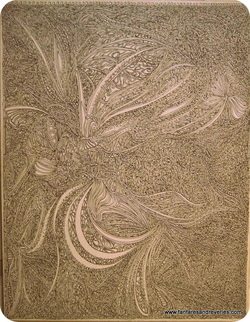 Pen & ink, 15"x19", G. Tompkins
Pen & ink, 15"x19", G. Tompkins In the late 1960's I often had occasion to travel via the Jersey Central Railroad from the Dunellen train station all the way to Newark, traversing the Hudson Tubes and eventually arriving at New York City. As an Art student enrolled in the New York Art Semester at Drew University, I was expected to visit museums and galleries, engage in class field trips to meet artists in their studio environments, and to keep a noteworthy journal of my thoughts, perceptions and observations. The Jersey Central provided a convenient method of commuting to NYC and I quickly became fond of train travel as an alternative to taking a car or bus to the City. The route began in Dunellen, traveled through Plainfield, Fanwood, Scotch Plains, Westfield, Garwood, and Cranford, finally reaching the great train station at Newark, a place of enormous overhead structures and miles of parallel tracks packed with passenger trains.
The View From a Train Window
There occurs a brief moment as you leave the train station at Fanwood heading East where the tracks curve slightly to the right and the train allows a view into the backyards of some vintage homes clustered along a stretch of wooded parcels of land to the North of the tracks. At this point the train seems to be at a somewhat higher elevation, perhaps as much as 10 feet higher than the backyards of the homes, giving the effect of looking downwards into a miniature canyon or autumnal valley. Just at this juncture of time and space, I would remember the lines from one of the songs by Judy Collins on her 1967 album "Wildflowers," a critically acclaimed album arranged and conducted by Joshua Rifkin. All of the songs on that recording are gems, but the one which keeps coming back to me is entitled "Albatross," one of the most beautiful works of art which Judy ever recorded. The first lines read, "The lady comes to the gate dressed in lavender and leather...," a poetic entry into a visual field of splendor. The song continues, "...She hears the steeple bells ringing through the orchard all the way from town." I do not remember if there were any gates that could be seen from the train windows, but there were certainly plenty of places that a gate might provide a beautiful entryway into these lovely homes with their petite backyards. Similarly one could occasionally view a church steeple briefly at some distance from the tracks, or imagine the bells heard in each neighborhood, or envision the neat topography of land laid out from the town center to the small wooded parcels dotted along the train tracks.
A Poetic Song with Evocative Images
Judy's song continues with vibrantly resonant language, pinpointing the grandeur of the human landscape as well as the natural landscape. "Many people wander up the hills from all around you, making up your memories and thinking they have found you." As I peer through the train windows I begin to see the history of the moment and the pattern of the events and the people in my life. From station to station, from track to track, from city to city....these thoughts and perceptions become the dialogues of a young art student transformed via time and the ongoing process of maturity. Judy speaks of "the embroidery of life" and then paints a picture which becomes indelibly etched in my artistic heart and mind. "...And in the night the iron wheels rolling through the rain, down the hills through the long grass to the sea." Joshua Rifkin's arrangement and orchestral conducting soar with an affinity for Judy's lovely voice during this powerful passage. There is a rise and fall of evocative feeling in this special music, conjuring images which remain impressively vivid.
Final Impressions
Judy's song "Albatross" closes with some perceptive observations on the continuity of life. "Day and night and day again, and people come and go away forever." Who hasn't reflected upon our days of schooling or early family life or days spent working or travelling or interacting with others via relationships? Wave upon wave of events may occur as cycles existing in time, like the train excursions via the Jersey Central, peering out the train windows and recording the impressions one may encounter or visualize along the way. Then in the closing lines to the song, Judy so eloquently, so elegantly, quietly recites a marvelously resonant and poetic message, "Come away alone, ...come away alone....with me." This is the memorable language of love, a time and a place which can be viewed as a tender invitation, a noble passage, an everlasting entrance or an eternal gate.
 RSS Feed
RSS Feed